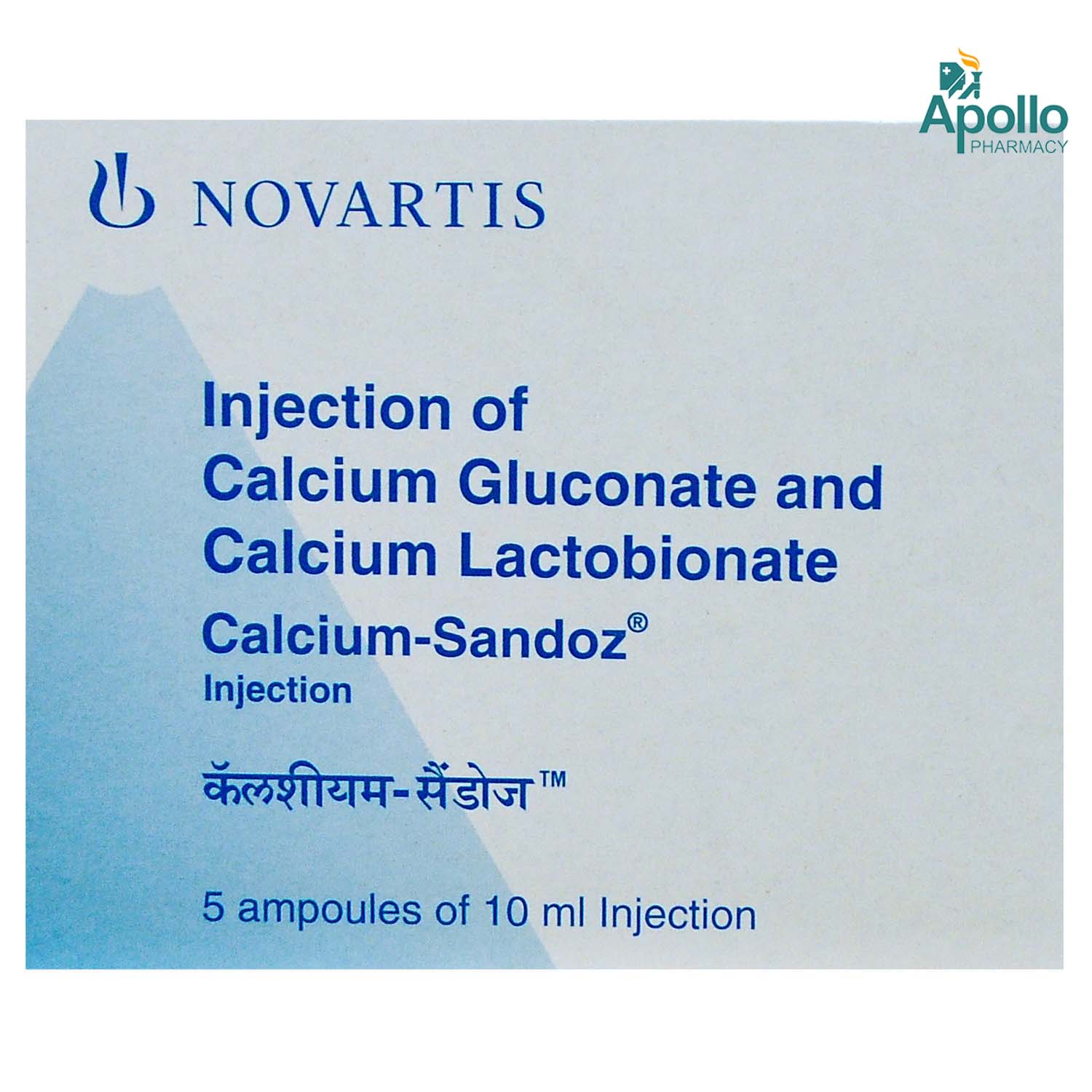Calcium Gluconate
About Calcium Gluconate
Calcium Gluconate is a mineral salt. It is a form of Calcium indicated for pediatric and adult patients to treat several medical conditions caused by low levels of Calcium in the body (hypocalcemia). Hypocalcemia is a treatable condition that happens when the calcium levels in your blood are too low. Many different health conditions can cause hypocalcemia.
Calcium Gluconate contains Calcium Gluconate, administered to increase Calcium's blood levels in the body, thereby reducing the risk of calcium disorders due to lack of Calcium in the body.
A healthcare professional administers Calcium Gluconate. Do not self-administer. Sometimes, you may experience local soft tissue inflammation, nausea, vomiting, sweating, and hot flushes. Most of these side effects do not require medical attention and gradually resolve over time. However, if the side effects persist or worsen, please consult your doctor.
Before taking the Calcium Gluconate, let your doctor know about all your medical conditions, sensitivities, and medications you are using. Calcium Gluconate should not be used in pregnant and nursing mothers unless clearly necessary. So, inform your doctor if you are a pregnant or nursing mother. Your doctor will weigh the benefits and potential risks before recommending Calcium Gluconate.
Uses of Calcium Gluconate
Medicinal Benefits
Calcium Gluconate contains Calcium Gluconate, which is administered to increase blood calcium levels in the body. It treats the body's calcium deficiency (hypocalcemia), thereby reducing the risk of calcium disorders due to low calcium levels. Calcium Gluconate is also used to treat high potassium levels in the blood, or an overdose of magnesium sulfate (i.e. Epsom salts), sudden severe stomach pain and during heart resuscitation to strengthen the heart muscle. It can be used to prevent abnormal heartbeat (arrhythmia) due to high potassium levels in the blood (severe hyperkalaemia) and helps to restore normal heart function in an emergency (cardiac arrest) if potassium levels in the blood are too high. On the other hand, it can treat lead and fluoride poisoning.
Directions for Use
- Follow your doctor’s instructions on the dosage and timing of this medication to ensure safety.
- Calcium Gluconate will be administered in the hospital setting by a trained healthcare professional.
- Do not self-administer.
Storage
Side Effects of Calcium Gluconate
- Local soft tissue inflammation
- Nausea
- Vomiting
- Sweating
- Hot flushes
Drug Warnings
Before receiving the Calcium Gluconate, inform your doctor if you are allergic to Calcium Gluconate or other medicines/foods. If you are pregnant or breastfeeding, think you may be pregnant, or plan to have a baby, ask your healthcare professional for advice before using this medicine. It is recommended not to use Calcium Gluconate Injection if the calcium levels in your blood or urine are above normal levels if you have severe heart disease if you have severe kidney disease, or if you suffer from galactosaemia (disorders of galactose metabolism). So, inform them about your medical conditions and the medications you are currently using to avoid potential interactions.
Drug Interactions
Drug-Drug Interactions: Calcium Gluconate may interact with medicines used in the treatment of HIV/AIDS (e.g. cabotegravir, dolutegravir), antibiotics (e.g. ceftriaxone), certain medicines used to treat heart failure (e.g. digitoxin, digoxin).
Drug-Food Interactions: Avoid the consumption of alcohol while taking Calcium Gluconate.
Drug-Disease Interactions: Inform your doctor if you have Phosphate Imbalance, Arrhythmias (irregular heartbeat), malabsorption (difficulty in the digestion or absorption of nutrients from food), renal dysfunction and sarcoidosis (The growth of tiny collections of inflammatory cells in different parts of the body).
Drug-Drug Interactions Checker List:
Safety Advice

Alcohol
cautionAvoid consumption of alcohol while on treatment with this medicine.

Pregnancy
cautionCalcium Gluconate should not be used during pregnancy unless clearly necessary. So, inform your doctor if you are pregnant or suspect pregnancy. Your doctor will weigh the benefits and potential risks before recommending Calcium Gluconate.

Breast Feeding
cautionCalcium Gluconate should not be used in nursing mothers unless clearly necessary. So, inform your doctor if you are breastfeeding. Your doctor will weigh the benefits and potential risks before recommending Calcium Gluconate.

Driving
safeCalcium Gluconate will not affect your ability to drive.

Liver
cautionIf you have a pre-existing or a history of liver disease, inform your doctor before taking Calcium Gluconate. Your doctor may adjust the dose of this medicine based on your condition.

Kidney
cautionIf you have a pre-existing or a history of kidney conditions, inform your doctor before taking Calcium Gluconate. Your doctor may adjust the dose of this medicine based on your condition.

Children
safe if prescribedPlease consult your doctor. Your doctor will weigh the risks and benefits before prescribing this medicine to your child.
Habit Forming
Diet & Lifestyle Advise
- Consume a well-balanced and healthy diet.
- Eat low-phosphorus foods such as sourdough bread, corn or rice cereals, cream of wheat, unsalted popcorn and some light-coloured sodas and lemonade.
- Avoid high-phosphorus foods, including bran cereals, oatmeal, nuts, sunflower seeds, whole-grain bread and dark-coloured colas.
- Limit or avoid alcohol consumption.
- Quitting smoking is the best strategy to lower the risk of illness.
Special Advise
- Your doctor may check the amount of electrolytes (e.g. calcium) in your blood at regular intervals.
Patients Concern
Disease/Condition Glossary
Hypocalcemia: Hypocalcemia is a curable condition that occurs when the calcium levels in your blood are abnormally low. Hypocalcemia can result from a variety of medical disorders. The most common symptoms of hypocalcemia are paresthesia, muscle spasms, cramps, tetany, circumoral numbness, and convulsions.
FAQs
Calcium Gluconate is indicated for pediatric and adult patients to treat several medical conditions caused by low levels of Calcium in the body (hypocalcemia).
Calcium Gluconate contains Calcium Gluconate, which is administered to increase Calcium's blood levels in the body, thereby reducing the risk of calcium disorders due to lack of Calcium in the body.
Calcium Gluconate is a mineral salt, which is administered to increase blood calcium levels in the body. It is used to treat the body's calcium deficiency (hypocalcemia), thereby reducing the risk of calcium disorders due to low calcium levels.
Calcium Gluconate can be used in the treatment of lead and fluoride poisoning.
Calcium Gluconate is to help restore normal heart function in an emergency (cardiac arrest) if potassium levels in the blood are too high.
Yes, Calcium Gluconate is safe and good for your health when used as advised by the doctor. Calcium Gluconate makes your bones strong and healthy by increasing calcium levels in your body. It reduces the risk of bone disorders like osteoporosis, making your bones less likely to fracture or break.
Do not use Calcium Gluconate if you are allergic to any of its components or if you already have high calcium levels in your blood. Your doctor will likely order a blood test before starting treatment to ensure it's safe for you.
High calcium levels in the blood and urine can cause health problems, including muscle weakness, kidney issues, constipation, nausea, weight loss, fatigue, and abnormal heart rhythms. If you're experiencing any of these symptoms, it's essential to consult your doctor immediately.
The calcium needs vary by age and gender. Teens need 1,300 mg daily, while adults need 1,000 mg until age 50. After 50, men need 1,000 mg, whereas women need 1,200 mg. However, your individual needs may differ, so it's best to consult your doctor for personalized advice.
When taking Calcium Gluconate, avoid taking antacids that contain calcium at the same time. Instead, maintain a gap of at least 2 hours between Calcium Gluconate and antacids to ensure safe and effective treatment.
It is not recommended to take antibiotics along with Calcium Gluconate as it might affect the absorption of other medicines. You are recommended to consult your doctor before taking antibiotics along with Calcium Gluconate.
Calcium Gluconate should be used during breastfeeding only if prescribed by your doctor as it is unknown whether the medication passes into the breastmilk. You are recommended to consult your doctor before using Calcium Gluconate during breastfeeding.
Calcium is a vital mineral that helps build strong bones and teeth and supports many bodily functions. Calcium also helps your body regulate hormones & aids muscle and nerve function.
Get your daily calcium fix from dairy foods like milk, yogurt, and cheese, as well as calcium-fortified soy products. You can also find smaller amounts of calcium in leafy green vegetables like kale and broccoli and in nuts and seeds like almonds and sesame seeds. These foods will help keep your bones strong and healthy.
The common side effects of Calcium Gluconate may include local soft tissue inflammation, nausea, vomiting, sweating, and hot flushes. Most of these side effects do not require medical attention and gradually resolve over time. However, if the side effects persist or worsen, please consult your doctor.





